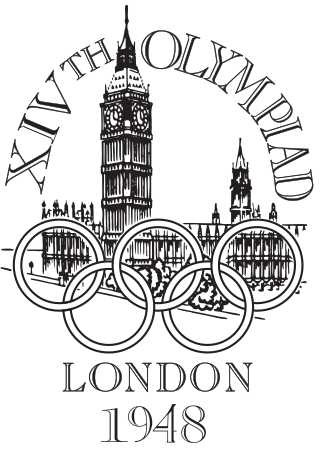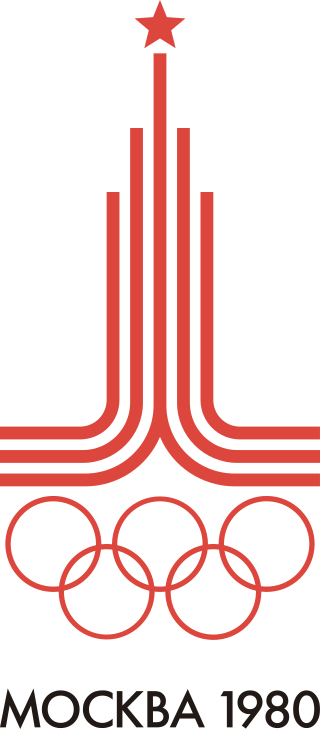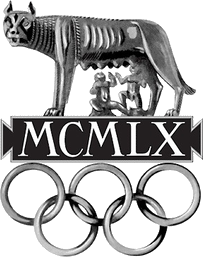Related Research Articles

The modern Olympic Games or Olympics are the leading international sporting events featuring summer and winter sports competitions in which thousands of athletes from around the world participate in a variety of competitions. The Olympic Games are considered the world's foremost sports competition with more than 200 teams, representing sovereign states and territories participating; by default the Games generally substitute for any World Championships the year in which they take place. The Olympic Games are held every four years; since 1994, they have been alternated between the Summer and Winter Olympics every two years during the four-year period.

The Summer Olympic Games, also known as the Games of the Olympiad, and often referred to as the Summer Olympics, is a major international multi-sport event normally held once every four years on leap years. The inaugural Games took place in 1896 in Athens, Greece, and the most recent Games were held in 2021 in Tokyo, Japan. The International Olympic Committee (IOC) is responsible for organising the Games and for overseeing the host city's preparations. The tradition of awarding medals began in 1904; in each Olympic event, gold medals are awarded for first place, silver medals for second place, and bronze medals for third place.
The Winter Olympic Games were created out of the success of the Summer Olympic Games, which are regarded as the largest and most prestigious multi-sport international event in the world.

The 1936 Summer Olympics, officially known as the Games of the XI Olympiad and commonly known as Berlin 1936, was an international multi-sport event held from 1 to 16 August 1936 in Berlin, Germany. Berlin won the bid to host the Games over Barcelona at the 29th IOC Session on 26 April 1931. The 1936 Games marked the second and most recent time the International Olympic Committee gathered to vote in a city that was bidding to host those Games. Later rule modifications forbade cities hosting the bid vote from being awarded the games.

The 1948 Summer Olympics were an international multi-sport event held from 29 July to 14 August 1948 in London, United Kingdom. Following a twelve-year hiatus caused by the outbreak of World War II, these were the first Summer Olympics held since the 1936 Games in Berlin. The 1940 Olympic Games had been scheduled for Tokyo and then for Helsinki, while the 1944 Olympic Games had been provisionally planned for London. This was the second time London hosted the Olympic Games, having previously hosted them in 1908, forty years earlier. The Olympics would return again to London 64 years later in 2012, making London the first city to host the games thrice, and the only such city until Paris and Los Angeles host their third games in 2024 and 2028, respectively. The 1948 Olympic Games were also the first of two summer Games held under the IOC presidency of Sigfrid Edström.

The 1996 Summer Olympics were an international multi-sport event held from July 19 to August 4, 1996, in Atlanta, Georgia, United States. These were the fourth Summer Olympics to be hosted by the United States, and marked the 100th anniversary of the 1896 Summer Olympics in Athens, the inaugural edition of the modern Olympic Games. These were also the first Summer Olympics to be held in a different year than the Winter Olympics since the Winter Olympics commenced in 1924, as part of a new IOC practice implemented in 1994 to hold the Summer and Winter Games in alternating, even-numbered years. The 1996 Games were the first of the two consecutive Summer Olympics to be held in a predominantly English-speaking country, preceding the 2000 Summer Olympics in Sydney, Australia. These were also the last Summer Olympics to be held in North America until 2028, when Los Angeles will host the games for the third time.

The 1976 Summer Olympics, officially known as the Games of the XXI Olympiad and commonly known as Montreal 1976, were an international multi-sport event held from July 17 to August 1, 1976, in Montreal, Quebec, Canada. Montreal was awarded the rights to the 1976 Games at the 69th IOC Session in Amsterdam on May 12, 1970, over the bids of Moscow and Los Angeles. It was the first and, so far, only Summer Olympic Games to be held in Canada. Toronto hosted the 1976 Summer Paralympics the same year as the Montreal Olympics, which still remains the only Summer Paralympics to be held in Canada. Calgary and Vancouver later hosted the Winter Olympic Games in 1988 and 2010, respectively.
The Olympic flame is a symbol used in the Olympic movement. It is also a symbol of continuity between ancient and modern games. Several months before the Olympic Games, the Olympic flame is lit at Olympia, Greece. This ceremony starts the Olympic torch relay, which formally ends with the lighting of the Olympic cauldron during the opening ceremony of the Olympic Games. The flame then continues to burn in the cauldron for the duration of the Games, until it is extinguished during the Olympic closing ceremony.

The 1988 Summer Olympics, officially known as the Games of the XXIV Olympiad and commonly known as Seoul 1988, was an international multi-sport event held from 17 September to 2 October 1988 in Seoul, South Korea. 159 nations were represented at the games by a total of 8,391 athletes. 237 events were held and 27,221 volunteers helped to prepare the Olympics.

The 1984 Summer Olympics were an international multi-sport event held from July 28 to August 12, 1984, in Los Angeles, California, United States. It marked the second time that Los Angeles had hosted the Games, the first being in 1932. California was the home state of the incumbent U.S. President Ronald Reagan, who officially opened the Games. These were the first Summer Olympic Games under the IOC presidency of Juan Antonio Samaranch.

The 1980 Summer Olympics, officially known as the Games of the XXII Olympiad and commonly known as Moscow 1980, were an international multi-sport event held from 19 July to 3 August 1980 in Moscow, Soviet Union, in present-day Russia. The games were the first to be staged in an Eastern Bloc country, as well as the first Olympic Games and only Summer Olympics to be held in a Slavic language-speaking country. They were also the only Summer Olympic Games to be held in a socialist state until the 2008 Summer Olympics held in China. These were the final Olympic Games under the IOC Presidency of Michael Morris, 3rd Baron Killanin, before he was succeeded by Juan Antonio Samaranch.

The 1972 Summer Olympics, officially known as the Games of the XX Olympiad and commonly known as Munich 1972, was an international multi-sport event held in Munich, West Germany, from 26 August to 11 September 1972.

The 1960 Summer Olympics, officially known as the Games of the XVII Olympiad and commonly known as Rome 1960, were an international multi-sport event held from 25 August to 11 September 1960 in Rome, Italy. Rome had previously been awarded the administration of the 1908 Summer Olympics, but following the eruption of Mount Vesuvius in 1906, the city had no choice but to decline and pass the honour to London. The Soviet Union won the most gold and overall medals at the 1960 Games.

The 1924 Summer Olympics, officially the Games of the VIII Olympiad and also known as Paris 1924, were an international multi-sport event held in Paris, France. The opening ceremony was held on 5 July, but some competitions had already started on 4 May. The Games were the second to be hosted by Paris, making it the first city to host the Olympics twice.

The 1920 Summer Olympics, officially known as the Games of the VII Olympiad and commonly known as Antwerp 1920, were an international multi-sport event held in 1920 in Antwerp, Belgium.

The 1908 Summer Olympics were an international multi-sport event held in London, England, United Kingdom, from 27 April to 31 October 1908. The 1908 Games were originally scheduled to be held in Rome, but were relocated on financial grounds following the violent eruption of Mount Vesuvius in 1906, which claimed over 100 lives; Rome eventually hosted the Games in 1960.

The 1904 Summer Olympics were an international multi-sport event held in St. Louis, Missouri, United States, from 29 August to 3 September 1904, as part of an extended sports program lasting from 1 July to 23 November 1904, located at what is now known as Francis Olympic Field on the campus of Washington University in St. Louis. The 1904 Summer Olympics were the first time the Olympic Games were held outside Europe.
James Lampley is an American sportscaster, news anchor, film producer, and restaurant owner. He was best known as a blow-by-blow announcer on HBO World Championship Boxing for 30 years. He also had covered a record 14 Olympic Games on U.S. television, most recently the 2008 Summer Olympics in Beijing, China.

Laos competed at the 1988 Summer Olympics in Seoul, South Korea. The nation returned to the Olympic Games after being part of the Soviet-led boycott of the 1984 Summer Olympics.

The 2024 Summer Olympics, officially the Games of the XXXIII Olympiad and commonly known as Paris 2024, is an upcoming international multi-sport event scheduled to take place from 26 July to 11 August 2024 in France, with Paris as the main host city and 16 other cities spread across metropolitan France, plus one subsite in Tahiti—an island within the French overseas country and overseas collectivity of French Polynesia.

Albania first participated at the Summer Olympic Games in 1972. They missed the next four games, three of them for political reasons due to the 1980 Summer Olympics boycott, 1984 Summer Olympics boycott and 1988 boycotts, but returned for the Barcelona 1992 Summer Olympics. They have appeared in all games since then. They made their Winter Olympic Games debut in 2006. Albania normally competes in events that include swimming, athletics, weightlifting, shooting, and wrestling. The country has not yet won any Olympic medal. Along with Andorra, Bosnia and Herzegovina, Malta and Monaco, Albania is one of five current European participants that have never won an Olympic medal. They have been represented by the Albanian National Olympic Committee since 1972.